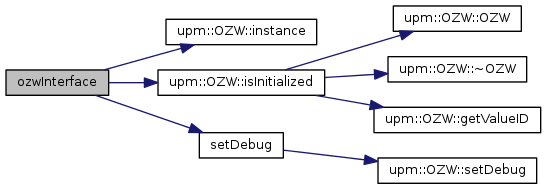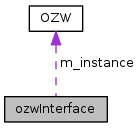|
upm
1.7.1
Sensor/Actuator repository for libmraa (v2.0.0)
|
|
upm
1.7.1
Sensor/Actuator repository for libmraa (v2.0.0)
|
UPM Interface API for OpenZWave (OZW) More...
This class implements some common access functions that are useful to any driver making use of the ozw driver.
It is intended to be inherited by device-specific ozw drivers, and provides some basic public methods all ozw drivers need to have, as well as protected access to other OZW facilities that are needed by a driver, but should not be exposed to the end-user.
Public Member Functions | |
| ozwInterface (int nodeID) | |
| virtual | ~ozwInterface () |
| virtual void | setDebug (bool enable) |
| virtual void | optionsCreate (std::string configPath="/etc/openzwave", std::string userConfigDir="", std::string cmdLine="") |
| virtual void | optionAddInt (std::string name, int val) |
| virtual void | optionAddBool (std::string name, bool val) |
| virtual void | optionAddString (std::string name, std::string val, bool append) |
| virtual void | optionsLock () |
| virtual void | init (std::string devicePath, bool isHID=false) |
| virtual void | dumpNodes (bool all=false) |
| virtual std::string | getValueUnits (int index) |
| virtual std::string | getValueLabel (int index) |
Protected Attributes | |
| bool | m_debugging |
| uint32_t | m_nodeID |
| OZW * | m_instance |
| bool | m_initialized |
| ozwInterface | ( | int | nodeID | ) |
ozwInterface constructor
| nodeID | The ZWave node number of the device we are interested in. |

|
virtual |
ozwInterface Destructor
|
virtual |
Enable some debugging output in this module as well as the OZW module. Debugging is disabled by default.
| enable | true to enable, false to disable. |


|
inlinevirtual |
Start configuration with basic options. This must be called prior to init(), after the OZW() constructor is called.
| configPath | Set the location of the OpenZWave config directory, default is /etc/openzwave |
| userConfigDir | Set the path to the user configuration directory. This is the location of the zwcfg*.xml and option.xml files for the user (probably created by the OpenZWave Control Panel example application). The default is the current directory (""). |
| cmdLine | Specify command line formatted options to OpenZWave. The default is "". |

|
inlinevirtual |
Add an integer Option. See the OpenZWave documentation for valid values.
| name | The name of the configuration option |
| val | The value to set it to |

|
inlinevirtual |
Add a boolean Option. See the OpenZWave documentation for valid values.
| name | The name of the configuration option |
| val | The value to set it to |

|
inlinevirtual |
Add a string Option. See the OpenZWave documentation for valid values.
| name | The name of the configuration option |
| val | The value to set it to true to append to the option, false to override |

|
inlinevirtual |
|
virtual |
This function initializes the underlying OZW Master singleton and the openzwave library in the event it has not already been initialized. If the OZW Master singleton has already been initialized, then this call will be ignored.
| devicePath | The path to the device, typically something like /dev/ttyACM0. |
| isHID | true if this is an HID device, false if it's a serial device. The default is false. |


|
inlinevirtual |
Dump information about all configured nodes and their valueids to stderr. This is useful to determine what nodes are available, and the index (used for querying and seting values for them). In addition, it includes information about each value (type, current value, etc).
| all | set to true to dump information about all values available for each node. If false, only information about 'user' values (ignoring 'system' and 'configuration') are output. The default is false ('user' values only). |

|
inlinevirtual |
Return a string (which may be empty) indicating the Units of measure for a given value. For example, querying a temperature value may return "F" to indicate Fahrenheit.
| index | The value index (see dumpNodes()) of the value to query. |

|
inlinevirtual |
Return a string (which may be empty) indicating the Label set for a given value. For example, querying a temperature value may return "Temperature" to indicate what it is.
| index | The value index (see dumpNodes()) of the value to query. |



 1.8.11
1.8.11